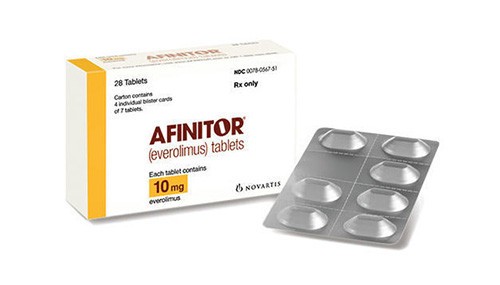
Everolimus
In the treatment of tumors and cancers, everolimus prevents cell growth, proliferation, and new blood vessel formation in the tumor microenvironment. Everolimus, an immunosuppressant, inhibits immune cell activation and proliferation to prevent transplant rejection.
Everolimus, a derivative of rapamycin, works similarly to rapamycin, another macrolide drug with antitumor and immunosuppressive properties. By inhibiting the activity of the mammalian target of rapamycin (mTOR) protein, everolimus controls the proliferation of tumor cells, as well as T and B immune cells.
Everolimus works in the following ways:
- It binds to FK binding protein-12 (FKBP-12) to form a complex that inhibits mTOR activity and cell proliferation.
- It reduces the activity of downstream effectors of mTOR, S6 ribosomal protein kinase (S6k1), and eukaryotic initiation factor 4E-binding protein (4E-BP1), thereby reducing protein synthesis.
- It inhibits vascular endothelial growth factor (VEGF) and hypoxia-inducible factor (HIF-1), reducing angiogenesis in the tumor environment.
- It reduces the growth of lipomas caused by mTOR dysregulation.
- It inhibits the activation and proliferation of T and B lymphocytes, preventing graft rejection in transplant patients.
The Afinitor and Afinitor Disperz brands of everolimus are used to treat certain metastatic cancers and tuberous sclerosis complex, a rare genetic disorder causing benign tumors to grow in various organs. The Zortress brand prevents transplant organ rejection. It is important to note that these brands are not interchangeable. The approved uses of everolimus are:
FDA-approved:
Adult:
- Hormone receptor-positive, HER2-negative breast cancer
- Advanced progressive neuroendocrine tumors of pancreatic origin
- Advanced renal cell carcinoma
- Tuberous sclerosis complex (TSC)-associated renal angiomyolipoma
- Prevention of kidney transplant rejection
- Prevention of liver transplant rejection
Adult and Pediatric:
Afinitor and Afinitor Disperz
- TSC-associated subependymal giant cell astrocytoma (SEGA)
- TSC-associated partial-onset seizures
Off-label:
Adult:
- Advanced, progressive carcinoid tumors
- Relapsed or refractory Hodgkin lymphoma
- Advanced, refractory thymoma and thymic carcinomas
- Relapsed or refractory Waldenstrom macroglobulinemia
- Lung transplantation
- Heart transplantation
Warnings
- Do not administer everolimus to patients with hypersensitivity to everolimus, sirolimus, other rapamycin derivatives, or any component of the everolimus formulation.
- Zortress brand warnings:
- Prescribe Zortress only to physicians experienced in immunosuppressive therapy and transplant patient management. Manage patients in facilities with adequate medical resources.
- Immunosuppression can increase susceptibility to infection and the development of malignancies such as lymphoma and skin cancer. Avoid prolonged exposure to UV light and sunlight.
- Reduce cyclosporine doses when used with Zortress to prevent kidney toxicity (nephrotoxicity and proteinuria). Monitor kidney function.
- Increased incidence of thrombosis in the kidneys and liver, leading to graft loss, has been reported.
- Concomitant use of cyclosporine and Zortress may increase the risk of thrombotic microangiopathy/thrombotic thrombocytopenic purpura/hemolytic uremic syndrome. Monitor hematologic parameters.
- Zortress is not recommended for heart transplant patients due to an increased risk of serious infection and mortality.
- Do not administer Zortress earlier than 30 days after liver transplant.
- Zortress may increase the risk of new-onset diabetes mellitus. Monitor blood glucose levels.
- Patients receiving immunosuppressants, including everolimus, are at an increased risk of opportunistic infections such as polyoma virus infections. BK virus infection can affect the kidney and lead to graft loss.
- Advise women of pregnancy potential and male patients with female partners to practice effective contraception during treatment and for 4 weeks after the last dose.
- If pregnancy occurs during treatment, inform the patient of the hazards to the fetus.
Side Effects of Everolimus
Common side effects of everolimus include:
- Oral inflammation (stomatitis)
- Constipation
- Diarrhea
- Nausea
- Vomiting
- Loss of appetite (anorexia)
- Taste disorder (dysgeusia)
- Severe hypersensitivity reactions
- Infections
- Fatigue
- Weakness (asthenia)
- High temperature (pyrexia)
- Headache
- Cough
- Shortness of breath (dyspnea)
- Lung inflammation (pneumonitis)
- Rash
- Dry skin
- Itching (pruritus)
- Bone marrow suppression (myelosuppression)
- Low red blood cell count (anemia)
- Decrease in lymphocyte immune cells
- Decrease in hemoglobin
- Peripheral edema
- Nasal bleeding (epistaxis)
- Increase in blood glucose levels
- Menstrual irregularities
- Impaired wound healing
- Kidney failure
- Hemorrhage
- High blood pressure (hypertension) including hypertensive crisis
- Congestive heart failure
- Rapid heart rate (tachycardia)
Less common side effects of everolimus include:
- Swelling beneath the skin and mucous membranes (angioedema)
- Swelling due to build-up of lymph fluid (lymphedema)
- Fluid collection in the abdomen (ascites)
- Gum inflammation (gingivitis)
- Gallbladder inflammation (cholecystitis)
- Gallstones (cholelithiasis)
- Narrowing (stenosis) of bile duct
- Inflammation of the pancreas (pancreatitis)
- Gastritis
- Abdominal hernia
- Blood clot in veins (deep vein thrombosis/DVT)
- Arterial thrombotic events
- Blood clot in lungs (pulmonary embolism)
- Vein inflammation (phlebitis)
- Bruising (ecchymosis)
- Microscopic blood clots in small blood vessels (thrombotic microangiopathy)
- Low blood pressure (hypotension)
- Cardiac failure with pulmonary hypertension
- Renal angiomyolipoma with tuberous sclerosis complex
- Increase in blood creatinine levels
- Frequent nighttime urination (nocturia)
- Ovarian cyst
- Male infertility
- Underactive thyroid (hypothyroidism)
- Osteoarthritis
- Reflex sympathetic dystrophy (RSD)
- Low blood potassium (hypokalemia)
- Low magnesium in blood (hypomagnesemia)
- Cytomegalovirus
- Sepsis and septic shock
- Radiation sensitization and radiation recall syndrome, an inflammatory reaction to certain anticancer drugs when administered after radiation
Contact your doctor immediately if you experience any of the following symptoms or serious side effects while using this drug:
- Serious heart symptoms including fast or pounding heartbeats, fluttering in your chest, shortness of breath, and sudden dizziness;
- Severe headache, confusion, slurred speech, severe weakness, vomiting, loss of coordination, feeling unsteady;
- Severe nervous system reaction with very stiff muscles, high fever, sweating, confusion, fast or uneven heartbeats, tremors, and feeling like you might pass out; or
- Serious eye symptoms including blurred vision, tunnel vision, eye pain or swelling, or seeing halos around lights.
This is not a complete list of all side effects or adverse reactions that may occur from the use of this drug. Contact your doctor for medical advice about serious side effects or adverse reactions. You may also report side effects or health problems to the FDA at 1-800-FDA-1088.
What Is Polycythemia Vera?
What Is Polycythemia Vera?


